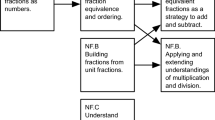Abstract
The provision of valid evidence of learning achievement and the need for accountability are two crucial factors in assessment. Projects and investigations, which provide evidence of communication in mathematics are discussed as a means to the direct assessment of the true objectives of the curriculum meeting the criteria of Eisner (1993). Using the methodology of Griffin and Forwood (1991), developed for adult literacy and numeracy scales, research in UK universities addresses the assessment of such tasks in mathematical modelling, pure mathematics and statistics. Analysis from this research, using item response modelling and the techniques of Linacre (1990) and Adams and Khoo (1992), describes student, judge and descriptor behaviour on rating scales which attempt to assess student achievement comprehensively. This paper focuses on the example of oral communication skills as an illustration. Implications of the research are discussed and questions are raised which require further investigation.
Similar content being viewed by others
References
Adams, R. J. and Khoo, S. T.: 1992, QUEST:The Interactive Test Analysis System, Australian Council for Educational Research, Hawthorn, Vic.
Berry, J. S. and Haines, C. R.: 1991, ‘Criteria and assessment procedures for projects in mathematics’, Workshop report, Exeter, 15–17 April 1991 [CTM75], PolySouthWest, 26 pp.
de Bock, D. and Roelens, M.: 1993, ‘The journey of the drilling rig Yatzy: Today on television, tomorrow as a large-scale modelling exercise’, in: J. de Lange, C. Keitel, I. D. Huntley, and M. Niss (eds.),Innovation in Maths Education by Modelling and Applications, Chichester: Ellis Horwood, pp. 211–224.
de Lange, J. and Verhage, H. B.: 1991,Data-visualization, Wings for Learning/Sunburst, Scotts Valley.
Eisner, E. W.: 1993, ‘Reshaping assessment in education: some criteria in search of practice’,Journal of Curriculum Studies 25, 219–233.
Falchikov, N. and Boud, D.: 1989, ‘Student self-assessment in higher education: A meta-analysis’,Review of Educational Research 59, 395–430.
Gasking, D. A. T.: 1948,Examinations and the aims of education, Melbourne University Press, Carlton, Vic.
Griffin, P. and Forwood, A.: 1991,Adult literacy and numeracy competency scales. An International Literacy Year Project. Phillip Institute of Technology, Melbourne, Vic.
Haines, C. R., Izard, J. F., and Le Masurier D. W.: 1993, ‘ Modelling intentions realized: Assessing the full range of developed skills’, in: T. Breiteg, I. D. Huntley and G. Kaiser-Messmer (eds.),Teaching and Learning Mathematics in Context, Ellis Horwood, Chichester.
Haines, C. R., Izard, J. F., Berry, J. S.et al.: 1993, ‘Rewarding student achievement in mathematics projects’,Research Memorandum 1/93, Department of Mathematics, City University, London, 54 pp.
Houston, S. K. (ed.): 1993,Developments in Curriculum and Assessment in Mathematics, University of Ulster: Belfast, 129 pp.
Izard, J.: 1992,Assessing learning achievement, (Educational studies and documents, 60), United Nations Educational, Scientific and Cultural Organization, Paris.
Izard, J. F. and Griffin, P. E.: 1991, ‘Systematic use of teacher observations to assess competency in reading, writing, and mathematics’, Paper presented at the Fourth Conference of the European Association for Research on Learning and Instruction (EARLI-4), University of Turku, Turku, Finland, 24–28 August, 1991.
Izard, J. F.: 1991, Issues in the assessment of non-objective and objective tasks, in: A. J. M. Luitjen (ed.),Issues in public examinations. (Proceedings of the 16th IAEA conference, Maastricht, The Netherlands, 18–22 June 1990.) Lemma, B.V., Utrecht, The Netherlands, pp. 73–83.
Kouba, V. L. and McDonald, J. L.: 1991, ‘What is mathematics to children?’,Journal of Mathematical Behaviour 10, 105–113.
Linacre, J. M.: 1990, ‘Modelling rating scales’, Paper presented at the Annual Meeting of the American Educational Research Association, Boston, MA., USA, 16–20 April, 1990, ED 318 803.
Madaus, G. F.: 1988, ‘The influence of testing on the curriculum’, in: L. N. Tanner (ed),Critical Issues in the Curriculum, 87th Yearbook of the National Society for the Study of Education I, National Society for the Study of Education, Chicago, IL, pp. 83–121.
McGaw, B., Eyers, V., Montgomery, J., Nicholls, B. and Poole, M.: 1990,Assessment in the Victorian Certificate of Education: Report of a review commissioned by the Victorian Minister for Education and the Victorian Curriculum and Assessment Board. Victorian Curriculum and Assessment Board, Melbourne, Vic.
Mousley, J. and Marks, G.: 1991,Discourses in mathematics, Deakin University Press, Geelong, Vic.
Stephens, M.: 1992, ‘Comprehensive assessment at senior secondary level in Victoria’, in: M. Stephens and J. Izard. (eds.),Reshaping assessment practices: Assessment in the mathematical sciences under challenge, Australian Council for Educational Research, Hawthorn, Vic., pp. 257–271.
Wheatley, G. H.: 1992, ‘The role of reflection in mathematics learning’,Educational Studies in Mathematics 23, 529–541.
White, R. T.: 1992, ‘Implications of recent research on learning for curriculum and assessment’,Journal of Curriculum Studies 24, 153–164.
Wilson, M.: 1992, ‘Measurement models for new forms of assessment education’, in: M. Stephens and J. Izard. (eds.)Reshaping assessment practices: Assessment in the mathematical sciences under challenge, Australian Council for Educational Research, pp. 77–98, Hawthorn, Vic.
Author information
Authors and Affiliations
Rights and permissions
About this article
Cite this article
Haines, C., Izard, J. Assessing mathematical communications about projects and investigations. Educ Stud Math 27, 373–386 (1994). https://doi.org/10.1007/BF01273378
Issue Date:
DOI: https://doi.org/10.1007/BF01273378




